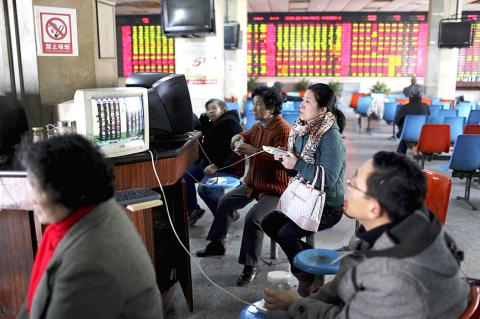Pacific Investment Management Co (PIMCO) sees a boom this year in issuance outside China by Chinese companies, driven by a record amount of Dim Sum bonds set to expire and a cash crunch in domestic markets.
Offshore yuan notes maturing this year, excluding certificates of deposits, will more than double to 91.1 billion yuan (US$15.1 billion), according to data compiled by Bloomberg.
The 3.95 percent average yield on Dim Sum bonds compares to a record 6.29 percent onshore and the 4.76 percent for dollar securities in Asia, according to Bank of America Merrill Lynch indexes that track yuan data since 2004.

Photo: Reuters
“A lot of local and Dim Sum bonds are coming up for maturity so there will be a lot of refunding needs,” said Raja Mukherji, the Hong Kong-based head of Asian credit research at PIMCO, manager of the world’s biggest bond fund. “Given that onshore rates have been ticking up in China, corporates may choose to go to the offshore bond markets and extend their maturity.”
Dim Sum bond issuance last quarter surged to the highest in more than two years and the offshore yuan climbed to a record on Thursday in Hong Kong as Chinese Premier Li Keqiang (李克強) accelerates efforts to ease currency controls and boost convertibility.
By contrast, onshore yuan issuance fell to the lowest since the first three months of 2012 as the world’s second-largest economy experiences the worst cash crunch since June last year.
The offshore yuan advanced 0.13 percent to 6.0492 per US dollar as of 5:01pm on Thursday in Hong Kong, data compiled by Bloomberg show.
It earlier touched 6.0448, the strongest level in data going back to August 2010.
People’s Bank of China Deputy Governor Yi Gang (易綱) wrote in a article on Wednesday that the nation will expand the opening up of its foreign-exchange market and expand its participants.
US dollar borrowing costs for companies in Asia rose 89 basis points last year, after the US Federal Reserve said it would reduce its bond purchases.
Average yields on offshore yuan notes fell 7 basis points in the same period, Bank of America Merrill Lynch data showed.
“Supply of Dim Sum bonds will increase in 2014 because of the refinancing needs, cost advantage over onshore and renminbi internationalization,” said Raymond Gui, a Hong Kong-based senior portfolio manager at Income Partners Asset Management, which oversaw US$1.4 billion in assets as of June last year.
“US dollar yields have been climbing these days, so I don’t see much cost advantage of dollar funding over Dim Sum for Chinese names,” he said.
In Shanghai, the yuan closed 0.05 percent higher on Thursday at 6.0506 against the greenback, China Foreign Exchange Trade System prices showed.
It earlier reached 6.0500, the strongest level since the government unified the market and official exchange rates at the end of 1993.
The seven-day repurchase rate, a gauge of interbank funding availability, averaged 5.16 percent last month, the highest since June, according to a daily fixing rate announced by China’s National Interbank Funding Center.
Last month’s cash crunch in the interbank market, the worst since June, is forcing Chinese companies to offer bonds at the highest yields since the 1997 Asian financial crisis.
Evergreen Holdings Group Co, an “AA-” rated shipbuilder with 16.5 billion yuan of debt, sold one-year notes at 9.9 percent on Dec. 6, the highest among publicly issued onshore bonds since 1997, according to data compiled by Bloomberg.

A proposed 100 percent tariff on chip imports announced by US President Donald Trump could shift more of Taiwan’s semiconductor production overseas, a Taiwan Institute of Economic Research (TIER) researcher said yesterday. Trump’s tariff policy will accelerate the global semiconductor industry’s pace to establish roots in the US, leading to higher supply chain costs and ultimately raising prices of consumer electronics and creating uncertainty for future market demand, Arisa Liu (劉佩真) at the institute’s Taiwan Industry Economics Database said in a telephone interview. Trump’s move signals his intention to "restore the glory of the US semiconductor industry," Liu noted, saying that

On Ireland’s blustery western seaboard, researchers are gleefully flying giant kites — not for fun, but in the hope of generating renewable electricity and sparking a “revolution” in wind energy. “We use a kite to capture the wind and a generator at the bottom of it that captures the power,” said Padraic Doherty of Kitepower, the Dutch firm behind the venture. At its test site in operation since September 2023 near the small town of Bangor Erris, the team transports the vast 60-square-meter kite from a hangar across the lunar-like bogland to a generator. The kite is then attached by a

Foxconn Technology Co (鴻準精密), a metal casing supplier owned by Hon Hai Precision Industry Co (鴻海精密), yesterday announced plans to invest US$1 billion in the US over the next decade as part of its business transformation strategy. The Apple Inc supplier said in a statement that its board approved the investment on Thursday, as part of a transformation strategy focused on precision mold development, smart manufacturing, robotics and advanced automation. The strategy would have a strong emphasis on artificial intelligence (AI), the company added. The company said it aims to build a flexible, intelligent production ecosystem to boost competitiveness and sustainability. Foxconn

Leading Taiwanese bicycle brands Giant Manufacturing Co (巨大機械) and Merida Industry Co (美利達工業) on Sunday said that they have adopted measures to mitigate the impact of the tariff policies of US President Donald Trump’s administration. The US announced at the beginning of this month that it would impose a 20 percent tariff on imported goods made in Taiwan, effective on Thursday last week. The tariff would be added to other pre-existing most-favored-nation duties and industry-specific trade remedy levy, which would bring the overall tariff on Taiwan-made bicycles to between 25.5 percent and 31 percent. However, Giant did not seem too perturbed by the